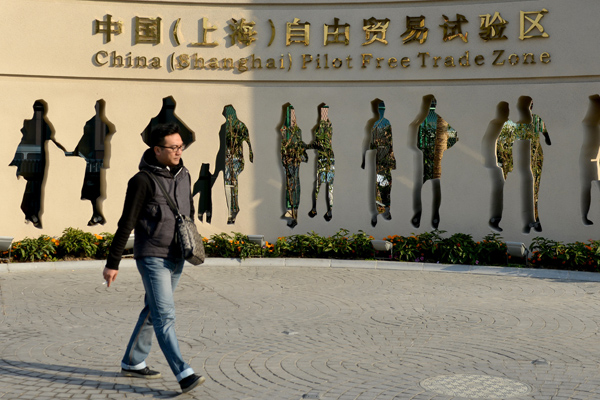New policy to benefit investment
 |
|
A visitor walks past a design promoting the China (Shanghai) Pilot Free-Trade Zone in Shanghai. [Photo/AFP] |
China's central bank will allow qualified international employees working in China (Shanghai) Pilot Free Trade Zone to open overseas personal free trade accounts, as part of a series of reforms encouraging innovation and cross-border investment.
The measure, announced at a news conference in Shanghai on Wednesday by the People's Bank of China, is the first of its kind allowing international staff working in the city to have easy and direct financing services through bank accounts at local lenders.
After the measure became effective on Wednesday, qualified foreigners could access cross-border financial services and do not have to use overseas services as they did before.
The central bank said the move was aimed at encouraging innovation, and cross-border investment and trade in a bid to make trade more active, and extend the functions of free trade accounts from corporate financing to personal financing.
Wang Xinhao, Shanghai Pudong Development Bank's Shanghai branch head, said that the new policy enables commercial banks and financing service providers to meet demand from high-level foreign employees in the city.
"This policy will make cross-border personal financing services more active, a long-term benefit for financial services providers in China," said Wang.
Steve Ma, an expert in the food and beverage sector and a senior executive with a multinational in Shanghai, said that he applauds the new policy because it will enable him to better utilize the financial services of local banks, including making financial plans for his families, such as wealth management, insurance and investment in financial products.
The regulator also announced a series of other measures to deepen opening up and reform as Shanghai Free Trade Zone has been piloting more policies which are likely to be adopted nationwide once they prove successful and beneficial to the country's economic and social development.
The measures included allowing private equity funds and projects in the free trade zone to raise capital in the zone as well as overseas and use the proceeds for cross-border investment.
Multinational corporations are allowed to establish onshore cross-border renminbi capital pools by using Shanghai Free Trade Zone accounts to manage their renminbi holdings globally, according to the central bank.
"A balanced inflow and outflow of capital in the Shanghai Free Trade Zone will benefit China's financial stability," said Zhou Hehua, Bank of China's Shanghai branch head.









